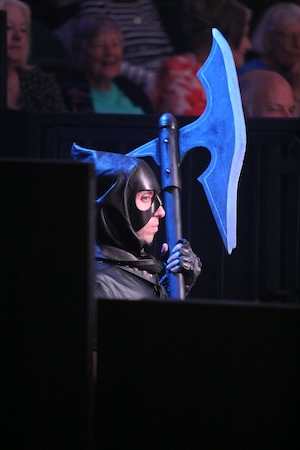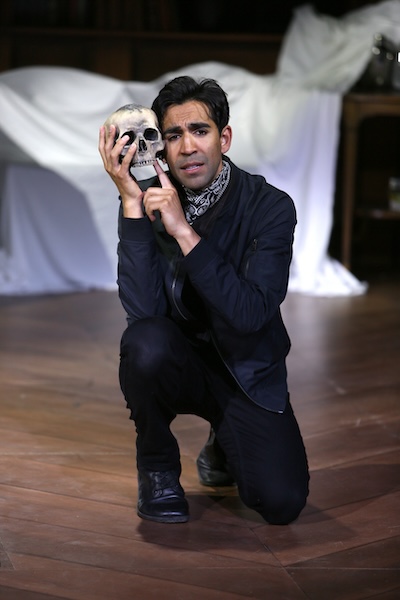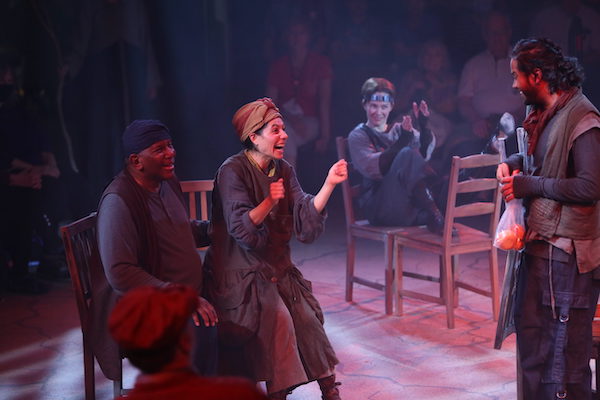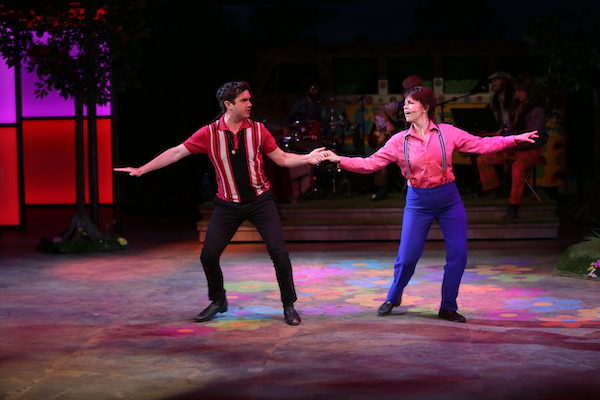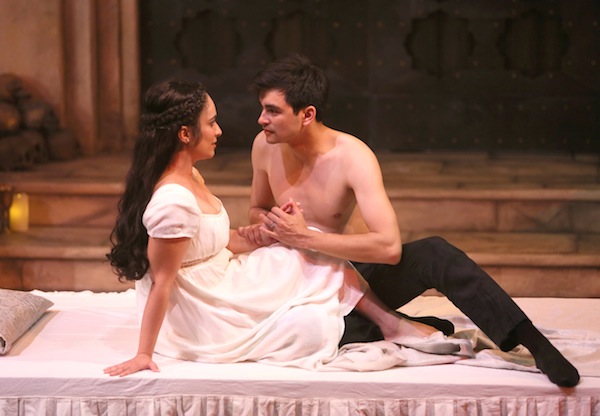Arghavan Jenati as Emilia Bassano and Nathan Kay as William Shakespeare in Jessica B. Hill’s The Dark Lady, now playing at Bard on the Beach. (photo by Tim Matheson)
There has always been a controversy over whether William Shakespeare was the sole author of all his works. He penned 37 plays and 154 sonnets, with 25 of the sonnets referencing a “Dark Lady,” with raven black brows and wiry hair. Perhaps she contributed to his writing in more tangible ways?
Current thinking is that the Dark Lady was Emilia Bassano, a Jewish woman whose father was Italian and mother Moroccan. She was headstrong and wanted to find success in her own right – something unheard of in Elizabethan England. She was the first woman there to have a work published, her Salve Deus, Rexum Judaeum (Hail G-d, King of the Jews).
In The Dark Lady, playwright Jessica B. Hill invites audiences to imagine what could have happened if Bassano and Shakespeare had met, particularly early on in his career, around 1589. At that time, Bassano was also starting on her quest to be a published poet. Hill postulates that Bassano enchanted Shakespeare and became his muse, collaborator and lover – and bore his child.
Bard on the Beach brings this Canadian work to the Douglas Campbell Stage under the steady hand of director Moya O’Connell. With only two characters and 90 minutes long with no intermission, it is an opportunity for the audience to invest in the all-consuming tension, both intellectual and sexual, between the protagonists.

Bassano is an intelligent match for Shakespeare and has no difficulty exchanging witty repartee with him. She challenges him to portray his female characters in a stronger light. At one point, he tells her, “Collaborate with me, I need your mind.” And she willingly gives him the benefit of it. However, despite her contributions, she watches his career flourish while her work remains unrecognized. Ironically, her influence becomes apparent in Shakespeare’s later works, where he does pen female characters who defy traditional stereotypes.
After Shakespeare’s death in 1616, Bassano comes across his folio of published works and is surprised to find that many of his female characters are named Emilia – clearly a tribute to her – which surprisingly appears to satisfy her thirst for recognition.
Arghavan Jenati plays Bassano with passion and fury, while Nathan Kay infuses the Bard with the right mix of angst and joy. The opening scene with their Elizabethan pas de deux is a precursor to their complex relationship dance and its inherent power struggle. One memorable scene is their experiment with cross-dressing, as trousered Jenati becomes an aggressive alpha male and Kay an innocent maiden.
While I enjoyed both performances, Jenati was more one-dimensional in her presentation, while Kay provided a more varied interpretation. The dialogue, while mostly classical, is peppered with modern jargon. Throughout, there are references to Bassano’s Judaism, including her grandfather’s forced conversion to Catholicism, his translation of the New Testament into Hebrew, the persecution of her people and her placing of a stone on Shakespeare’s grave in the final scene.
Ryan Cormack’s sparse set is simple, a series of stacked crates containing various props and costumes. Flowing red silks become bed sheets for the lovers while a cape morphs from a picnic blanket to a shawl to a baby’s coverlet to a shroud. The lighting plays dark or light as needed. Bespoke music by composer and sound designer Anju Singh becomes the third actor in the play, as it accompanies the couple through their 30-year relationship. Alaia Hamer, the costumer, outfits Bassano in a whimsical white frock covered with a suede drawstring bodice while Kay is given a period look for a gentleman of his time.
This is a production well worth seeing. As artistic director Christopher Gaze notes in the press release, “The Dark Lady invites us to consider how stories are shaped and who gets to shape them.” Director O’Connell sees the play as “an opportunity to shine a light on Bassano and spend time in her orbit.”
Running on alternate nights with The Dark Lady on the small stage is the fast-paced, slapstick romp through all of Shakespeare’s plays and sonnets, The Complete Works of William Shakespeare (abridged) [revised][again]. Jenati and Kay, along with Craig Erickson and Tess Degenstein, share duties with a different combination of three of them taking the stage each night. Director Mark Chavez is at the helm of this irreverent take on the Bard’s repertoire.
On opening night, Kay, Erickson and Degenstein were on stage and were hilarious in their efforts to cover all of the Bard’s works in 90 minutes to avoid a penalty (an offstage voice counts down the minutes). Rife with contemporary references to all things Vancouver and Bard, the audience was in nonstop laugh mode from the start. The second act is all Hamlet, done forwards, backwards and upside down – a credit to the talented, energetic thespian trio. Warning: audience participation is part of the shtick, so you may not want to sit in the front rows.
Cormack’s set is lined with shelves of props from past Bard productions and Hamer brings back statement pieces from the past for the show. Jewish community member Anton Lipovetsky provides the sound design.
This show is probably the most fun you will have at Bard this season. And, if you’ve hated Shakespeare since your high school English classes, it might just change your mind.
For tickets to all the Bard shows, which run to Sept. 19/20, go to bardonthebeach.org or call 604-739-0559.
Tova Kornfeld is a Vancouver freelance writer and lawyer.





